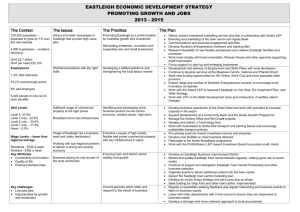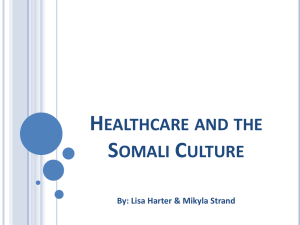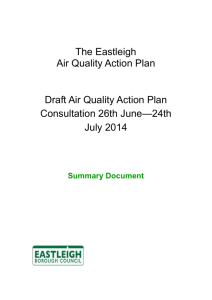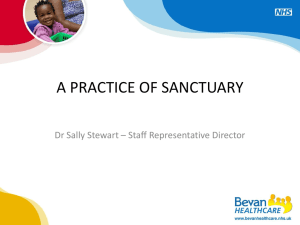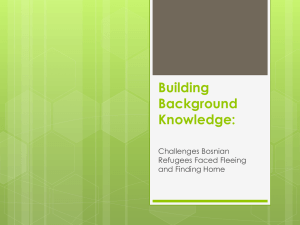Beyond the Failed State: Capital Mobilization, Investment and
advertisement
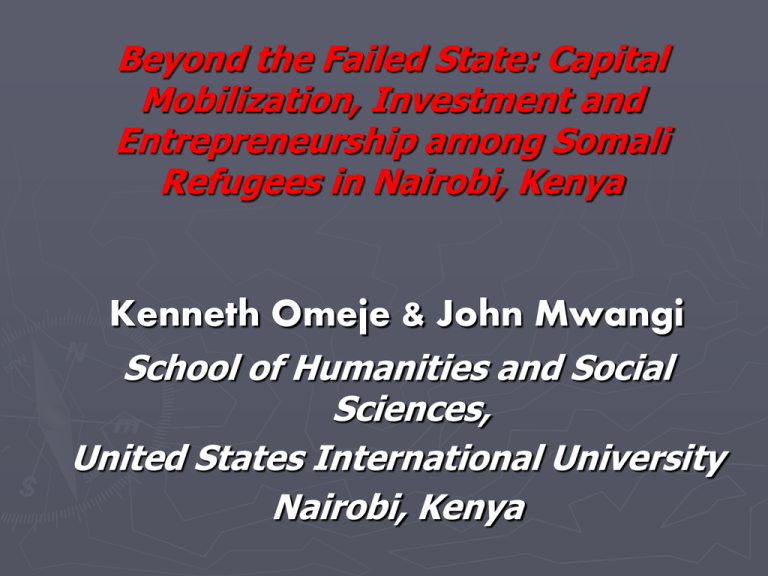
Beyond the Failed State: Capital Mobilization, Investment and Entrepreneurship among Somali Refugees in Nairobi, Kenya Kenneth Omeje & John Mwangi School of Humanities and Social Sciences, United States International University Nairobi, Kenya Specific Research Objectives (1) How members of the Somali refugee community source their business capital. (2) The history, structure and culture of the entrepreneurship of Somali refugees in Nairobi, including: - the role of traditional community values and kinship networks in business conception, apprenticeship, capital formation and issues of credit, investment, and supply & distribution of merchandize. Specific Research Objectives (3) The nature of social relations between the Somali refugee business community and the Kenyan stakeholders. (4) Any gender dimensions in the Somali refugee business profile, especially the role, activities and challenges of Somali women. (5) Any transnational dimensions in the Somali refugee business operation and their dynamics. Study Background and Justification ► People fleeing war from the failed state of Somalia have accounted for the largest number of refugees in Kenya since the start civil war in Somali in 1991. ► There are over 1 million Somali refugees in Kenya; most of them are in refugee camps in some government designated border outpost. ► The refugee crisis is aggravated by periodic incidents of drought & famine in the region. ► The refugees in camps fit into the traditional image of refugees. Food Insecurity & Refugee Crises in the Horn of Africa Study Background and Justification ► There are between 150,000 – 200,000 Somali refugees settled in Kenyan capital city of Nairobi. ► The refugees in Nairobi are mostly concentrated in the famous Nairobi suburb of Eastleigh - ‘Little Mogadishu.’ ► Eastleigh is a densely populated suburb with practically little or no state presence save for occasional intervention of security in the name of anti-terrorist clampdown. Study Background and Justification ► Kinship networks and clan solidarity underpin social order among the Somalis in Eastleigh. ► Ironically, the same clan-based social structure that underpins social order in Eastleigh is at the root of the continuing civil war in Somalia. ► Eastleigh is not just a Somali refugees’ haven, it is one of East Africa’s fastest growing and most globally connected trading centers. Study Background and Justification ► Dominant narratives on refugees from fragile and failed states in the Africa are largely focused on negative stereotypes that tend to perceive refugees as: ► poverty-stricken, and unwanted parasites that bring undue pressure on meager state resources; ► perpetrators of organized crime and anti-social behavior. Study Justification ► The prolific business exploits and transnational entrepreneurship of the large number of Somali refugees in Nairobi seems to shatter this well-entrenched conception. Fieldwork Methodology and Progress Made Our fieldwork data collection is essentially based on semistructured in-depth interview and non-participant observation. ► Fieldwork was completed between March and August 2011. ► Two Kenyan Somali female university graduates were recruited to join the project team in the fieldwork. ► Pre-fieldwork [consultative] visits were made for reconnaissance and sensitization of targeted audience. ► The research audience included: (a) Somali refugees of various generations and business clusters, as well as those not yet in any venture, (b) Kenyan police officers with experience in refugee policing and deployment in Somali suburb of Eastleigh, (c) Members of the rival Indian business community in Nairobi, & (d) Some of the local Kenyans that live and work with Somali refugees in the Eastleigh and the adjoining suburbs. ► Fieldwork Methodology and Progress Made ► ► ► A total of 136 participants were interviewed using convenience and snowball sampling methods. About half of the sample were ethnic Somali refugees interviewed. At present, we are the early stage of data interrogation, interpretation and analysis. Fieldwork Challenges Difficulty in getting some of the respondents to speak on some of the seemingly sensitive issues. ► Frequent interruptions in the course of the interviews essentially because we conducted all interviews during the respondents’ working hours. ► Figure 1. Chase Bank in the Main Street of Eastleigh Nairobi, Kenya. Figure 2 Fresh fruit hawking along the walkway of shopping malls in Eastleigh, Nairobi Figure 3 Financial institutions and modern shopping malls along a dilapidated murky road in the Eastleigh suburb of Nairobi Figure 4 Modern shopping malls amidst dilapidated road infrastructure in Eastleigh, Nairobi Figure 5 Madina Mall, a famous shopping mall in Eastleigh, Nairobi Figure 6 Street hawking in Eastleigh, Nairobi Figure 7 Pedestrians and Shoppers in Eastleigh, Nairobi Figure 8 A public service bus manoeuvres through a murky road in Eastleigh, Nairobi. Figure 10 A new business site under construction along a murky road in Eastleigh. Figure 11 A modern shopping mall in Eastleigh, Nairobi Figure 12 Shoppers and Traders in Eastleigh, Nairobi Figure 13 Back street hawking in Eastleigh. Figure 14 Women traders and shoppers in Eastleigh. Figure 15 Women street traders display their wares in Eastleigh, Nairobi THE END ► Thank you for your attention.
